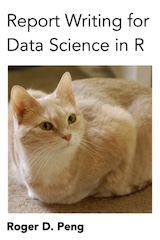
|
FreeComputerBooks.com
Links to Free Computer, Mathematics, Technical Books all over the World
|
|
- Title: Report Writing for Data Science in R
- Author(s) Roger D. Peng
- Publisher: Leanpub
- Hardcover/Paperback: N/A
- eBook: PDF
- Language: English
- ISBN-10/ASIN: N/A
- ISBN-13: N/A
- Share This:

|
This book teaches the fundamental concepts and tools behind reporting modern data analyses in a reproducible manner. As data analyses become increasingly complex, the need for clear and reproducible report writing is greater than ever.
About the Authors- Roger D. Peng is a Professor of Statistics and Data Sciences at the University of Texas, Austin.
- The R Programming Language
- Data Science
- Data Analysis and Data Mining, Big Data
- Statistics, Mathematical Statistics, and SAS Programming

- Report Writing for Data Science in R (Roger D. Peng)
- The Mirror Site (1) - PDF
- Book Homepage (Downloads, etc.)
-
 R for Data Science: Visualize, Model, Transform, Tidy, Import
R for Data Science: Visualize, Model, Transform, Tidy, Import
This book teaches you how to do data science with R: You'll learn how to get your data into R, get it into the most useful structure, transform it, visualize it and model it, how data science can help you work with the uncertainty and capture the opportunities.
-
 Engineering Production-Grade Shiny Apps (Colin Fay, et al)
Engineering Production-Grade Shiny Apps (Colin Fay, et al)
This book helps people build production-grade Shiny applications, by providing advice, tools, and a methodology to work on web applications with R, with a series of approaches and advice about optimizations for production.
-
 Mastering Shiny: Apps, Reports, and Dashboards Powered by R
Mastering Shiny: Apps, Reports, and Dashboards Powered by R
Master the Shiny web framework - and take your R skills to a whole new level. By letting you move beyond static reports, Shiny helps you create fully interactive web apps for data analyses.
-
 Doing Data Science in R: An Introduction for Social Scientists
Doing Data Science in R: An Introduction for Social Scientists
This approachable introduction to doing data science in R provides step-by-step advice on using the tools and statistical methods to carry out data analysis. It builds knowledge and skills gradually.
-
 Tidyverse Skills for Data Science (Carrie Wright, et al)
Tidyverse Skills for Data Science (Carrie Wright, et al)
This book is intended for data scientists with some familiarity with the R programming language who are seeking to do data science using the Tidyverse family of packages, covers the entire life cycle of a data science project and presents specific tidy tools for each stage.
-
 Tidy Modeling with R: A Framework for Modeling in the Tidyverse
Tidy Modeling with R: A Framework for Modeling in the Tidyverse
This book shows data analysts, business analysts, and data scientists how the tidymodels framework offers a consistent, flexible approach for your work. It demonstrate ways to create models by focusing on an R dialect called the Tidyverse.
-
 R Programming for Data Science (Roger D. Peng)
R Programming for Data Science (Roger D. Peng)
This book is about the fundamentals of R programming. Get started with the basics of the language, learn how to manipulate datasets, how to write functions, and how to debug and optimize code. You will have a solid foundation on data science toolbox.
-
 Exploratory Data Analysis with R (Roger D. Peng)
Exploratory Data Analysis with R (Roger D. Peng)
This book covers the essential exploratory techniques for summarizing data with R. These techniques are typically applied before formal modeling commences and can help inform the development of more complex statistical models.
-
 R Markdown: The Definitive Guide (Yihui Xie, et al)
R Markdown: The Definitive Guide (Yihui Xie, et al)
With R Markdown, you can easily create reproducible data analysis reports, presentations, dashboards, interactive applications, books, dissertations, websites, and journal articles, while enjoying the simplicity of Markdown and the great power of R and other languages.
-
 blogdown: Creating Websites with R Markdown (Yihui Xie, et al)
blogdown: Creating Websites with R Markdown (Yihui Xie, et al)
Provides a practical guide for creating websites using the blogdown package in R. Use dynamic R Markdown documents to build static websites with automatically rendered output such as graphics, tables, analysis results, and HTML widgets.
-
 bookdown: Authoring Books/Tech Documents with R Markdown
bookdown: Authoring Books/Tech Documents with R Markdown
This book presents a much easier way to write books and technical publications than traditional tools such as LaTeX and Microsoft Word. You can make better use of document elements such as figures, tables, equations, theorems, citations, and references.





